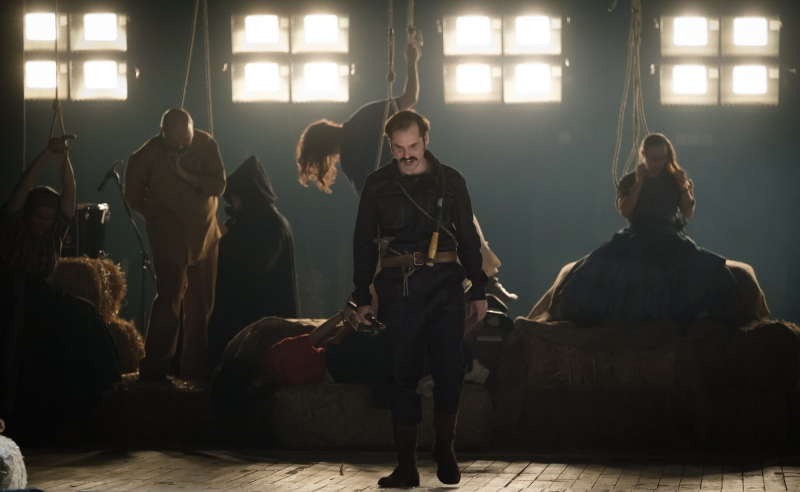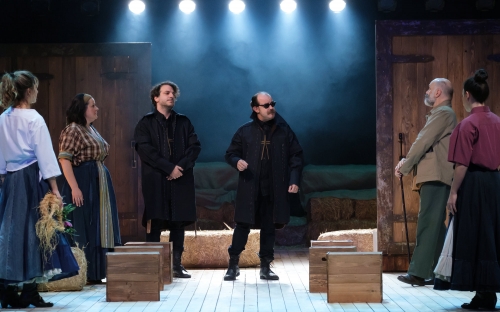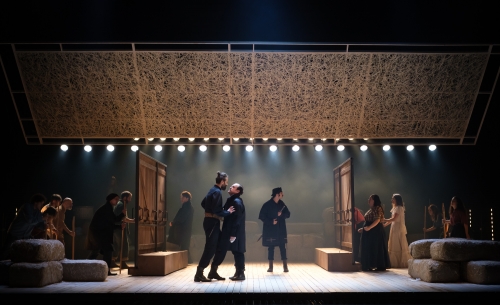The arrival of Commander Fernán Gómez in sleepy Fuente Ovejuna throws the lives of the villagers into turmoil as his authoritarianism and brutality go unchecked. Gómez treats all the women of the village as his personal property, believing that he has absolute power over them, and mercilessly punishes anyone who tries to stop him. One of the women, Laurencia, is the daughter of the mayor. With the help of Frondoso, who is in love with her, Laurencia manages to escape. However, seeing that the Commander will not give up the chase, the villagers resolve to endure his criminal behaviour no longer and to stand together to defend their rights. So it is, incited by the threat to their women, that the peasants revolt; united as one, they kill the tyrannical commander to restore morality and justice to their village. Significantly, the tyrant’s life is brought to an end not by an individual but by the whole of Fuente Ovejuna.
A major work of the Spanish Baroque, Fuente Ovejuna – meaning “The Sheepwell” – was published in 1619. Its source was The Chronicle of Fray Francisco de Rades y Andrada, written four decades earlier, which describes a historical event of 1476 involving the village of Fuente Ovejuna. This was a period of great political unrest, in which the Spanish aristocracy clashed repeatedly with King Ferdinand and Queen Isabella. Lope de Vega condemned the unfairness of the feudal system, while at the same time affirming the people’s acceptance of royal authority.
Information
Saturday, Sunday & public holidays
Premium seats €25
Zone A €18
Zone B (lower circle) €15
Zone C (upper circle) €10
Wednesday & Thursday
Premium seats €18
Zones A & B €15
Zone C €10
Friday
Premium seats €18
General admission €13
Restricted view seats €10
ZILLER BUILDING - MAIN STAGE
Wendsday: 19: 30
Thursday – Sunday: 20:30
Duration: 120', without intermission
Surtitles: English, on selected dates
* Recommended seats for best surtitles viewability: central seats in the stalls & the lower circle
The National Theatre of Greece's theatres are Covid-free spaces. Under the current rules, this means that they are open only to the fully vaccinated and those who have recovered from Covid-19 in the last six months. To enter our theatres you must show a certificate of vaccination or recovery.
The requirement to present a valid certificate of vaccination or recovery applies to audience members aged 18 and over. For children aged four to seventeen-year-olds, a negative self-test performed within the previous 24 hours is required.
Masks must be worn and social distancing must be maintained both when entering and leaving the theatre and during performances. Proof of identity must also be provided when presenting certificates or negative PCR tests or rapid tests.
creation team
-
Maria Hatziemmanouil
Translation -
Eleni Efthymiou
Director -
Sophia Eftychiadou
Dramaturgy -
Zoi Molyvda-Fameli
Set design -
Angelos Mentis
Costume design -
Lefteris Veniadis
Music -
Tassos Papadopoulos
Movement -
Sakis Birbilis
Lighting design -
Dimitris Zachos
Video -
Melina Peonidou
Music coach -
Katerina Bousia-Alexaki
Set design assistant -
Aella Tsilikopoulou
Costume design assistant -
Yannis Varvaressos
Directing assistant -
Irene Lamprinopoulou
Directing assistant -
Giorgos Pavlou
Directing assistant -
Olga Faleichyk
Make up design -
Eva Saraga
Production dramaturg
cast
-
Maria Savvidou
Narrator -
Giannis Mastrogiannis
Counsellor from Ciudad Real, Musician in Fuente Ovejuna -
Ilya Algaer
Counsellor from Ciudad Real, Musician in Fuente Ovejuna -
Giorgos Kritharas
Fernán Gómez de Guzmán -
Thanassis Dimou
Flores -
Christos Kontogeorgis
Ortuño, Executioner -
Dimitris Fourlis
Rodrigo Téllez Girón, Peasant -
Tassos Dimitropoulos
Cimbranos, Don Manrique, Inquisitor -
Nikos Hatzopoulos
Esteban -
Vassiliki Troufakou
Laurencia -
Yiannis Papadopoulos
Juan Rojo -
Dimitris Kitsos
Frondoso -
Dionysis Pifeas
Barrildo -
Thanasis Zeritis
Mengo -
Eleni Stergiou
Olaya -
Erato Pissi
Jacinta -
Nancy Sideri
Pascuala -
Loxandra Loukas
Child -
Maria Georgiadou
Queen Isabella, Peasant -
Babis Galiatsatos
King Ferdinand, Peasant





























